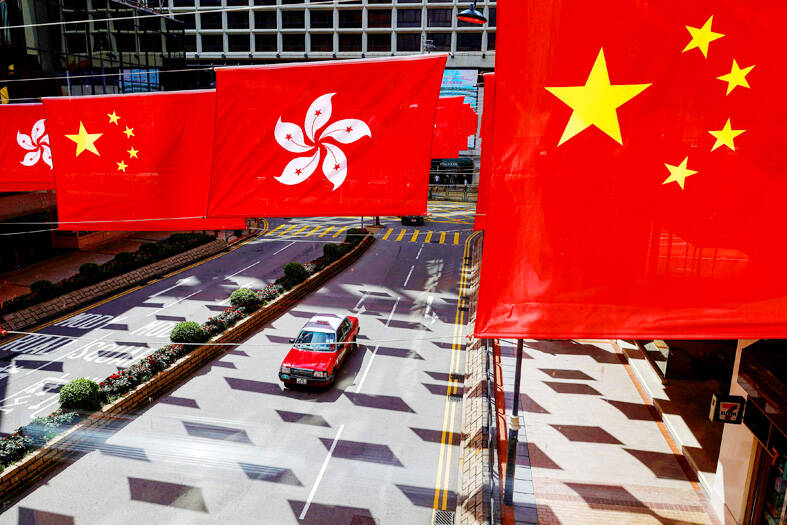China’s appointment of a top intelligence official to run Hong Kong’s national security regime underscores its determination to tighten its grip on territory, diplomats and analysts said.
Dong Jingwei (董經緯), 59, is the highest-level Chinese security official to be appointed to a senior role in Hong Kong since Beijing imposed the National Security Law on the territory in 2020.
He has been appointed director of the Office for Safeguarding National Security of the Central People’s Government in the Hong Kong Special Administrative Region, Beijing said in a statement on Tuesday.

Photo: Reuters
Dong would be expected to bolster security oversight of Hong Kong, rocked for months in 2019 by pro-democracy protests that posed a crisis for the Chinese Communist Party leadership.
Under the security law, China’s national security office has sweeping investigative and surveillance powers, and enjoys immunity from Hong Kong laws.
The office is also charged with oversight of “foreign countries and international organizations.”
Dong was Chinese vice minister of state security, a role that included catching foreign spies in China, state media reports said.
Dong told a ministry symposium in 2021 of the need for a “people’s war” against espionage, working to “not only catch spies but ... to catch internal traitors” who colluded with foreign spy agencies, a Chinese government statement said.
The Chinese Ministry of State Security is playing a major role in a clampdown on some foreign due diligence firms in China that has added to tensions with the US, diplomats say.
The ministry could not be reached for comment.
Dong’s appointment comes as Hong Kong prepares to bolster its national security regimen with a new law, called Article 23, that Hong Kong officials say would encompass espionage and treason among other offenses not covered in the 2020 legislation.
In an essay published in July last year in a journal dedicated to Chinese President Xi Jinping’s (習近平) thinking on the rule of law, Dong said that “Western forces” had been instigating a “color revolution” in Hong Kong, and the security law had been vital to restore order.
“The appointment of such a powerful intelligence figure as Dong to take charge in Hong Kong is a bit of surprise,” one Asian envoy said. “The government is trying to show it is open for international business, but this will send a shiver and raises fresh questions about the future operating environment.”
Additional reporting by Bloomberg

SEPARATE: The MAC rebutted Beijing’s claim that Taiwan is China’s province, asserting that UN Resolution 2758 neither mentions Taiwan nor grants the PRC authority over it The “status quo” of democratic Taiwan and autocratic China not belonging to each other has long been recognized by the international community, the Mainland Affairs Council (MAC) said yesterday in its rebuttal of Beijing’s claim that Taiwan can only be represented in the UN as “Taiwan, Province of China.” Chinese Minister of Foreign Affairs Wang Yi (王毅) yesterday at a news conference of the third session at the 14th National People’s Congress said that Taiwan can only be referred to as “Taiwan, Province of China” at the UN. Taiwan is an inseparable part of Chinese territory, which is not only history but

CROSSED A LINE: While entertainers working in China have made pro-China statements before, this time it seriously affected the nation’s security and interests, a source said The Mainland Affairs Council (MAC) late on Saturday night condemned the comments of Taiwanese entertainers who reposted Chinese statements denigrating Taiwan’s sovereignty. The nation’s cross-strait affairs authority issued the statement after several Taiwanese entertainers, including Patty Hou (侯佩岑), Ouyang Nana (歐陽娜娜) and Michelle Chen (陳妍希), on Friday and Saturday shared on their respective Sina Weibo (微博) accounts a post by state broadcaster China Central Television. The post showed an image of a map of Taiwan along with the five stars of the Chinese flag, and the message: “Taiwan is never a country. It never was and never will be.” The post followed remarks

INVESTMENT WATCH: The US activity would not affect the firm’s investment in Taiwan, where 11 production lines would likely be completed this year, C.C. Wei said Investments by Taiwan Semiconductor Manufacturing Co (TSMC, 台積電) in the US should not be a cause for concern, but rather seen as the moment that the company and Taiwan stepped into the global spotlight, President William Lai (賴清德) told a news conference at the Presidential Office in Taipei yesterday alongside TSMC chairman and chief executive officer C.C. Wei (魏哲家). Wei and US President Donald Trump in Washington on Monday announced plans to invest US$100 billion in the US to build three advanced foundries, two packaging plants, and a research and development center, after Trump threatened to slap tariffs on chips made

CONSISTENT COMMITMENT: The American Institute in Taiwan director said that the US would expand investment and trade relationships to make both nations more prosperous The US would not abandon its commitment to Taiwan, and would make Taiwan safer, stronger and more prosperous, American Institute in Taiwan Director Raymond Greene said. “The US’ commitment to Taiwan has been consistent over many administrations and over many years, and we will not abandon our commitment to Taiwan, including our opposition to any attempt to use force or coercion to change Taiwan’s status,” he said in an exclusive interview with the Liberty Times (the sister newspaper of the Taipei Times) on Friday last week, which was published in the Chinese-language newspaper yesterday. The US would double down on its efforts